check Peugeot Bipper 2011 User Guide
[x] Cancel search | Manufacturer: PEUGEOT, Model Year: 2011, Model line: Bipper, Model: Peugeot Bipper 2011Pages: 180, PDF Size: 5.14 MB
Page 38 of 180
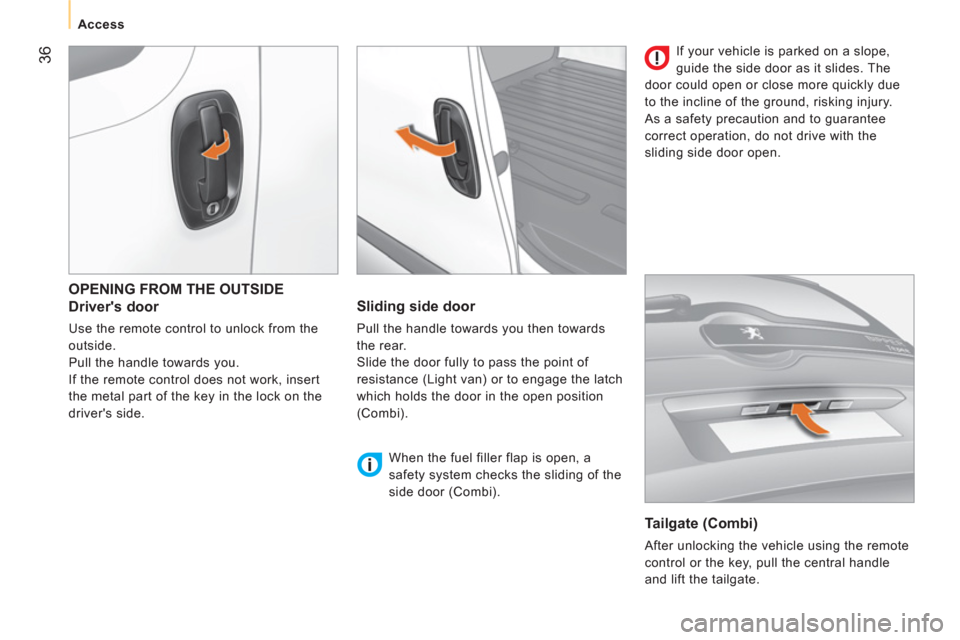
36
Access
OPENING FROM THE OUTSIDE
Driver's door
Use the remote control to unlock from the
outside.
Pull the handle towards you.
If the remote control does not work, insert
the metal part of the key in the lock on the
driver's side.
Sliding side door
Pull the handle towards you then towards
the rear.
Slide the door fully to pass the point of
resistance (Light van) or to engage the latch
which holds the door in the open position
(Combi).
When the fuel filler flap is open, a
safety system checks the sliding of the
side door (Combi).
Tailgate (Combi)
After unlocking the vehicle using the remote
control or the key, pull the central handle
and lift the tailgate. If your vehicle is parked on a slope,
guide the side door as it slides. The
door could open or close more quickly due
to the incline of the ground, risking injury.
As a safety precaution and to guarantee
correct operation, do not drive with the
sliding side door open.
Page 41 of 180
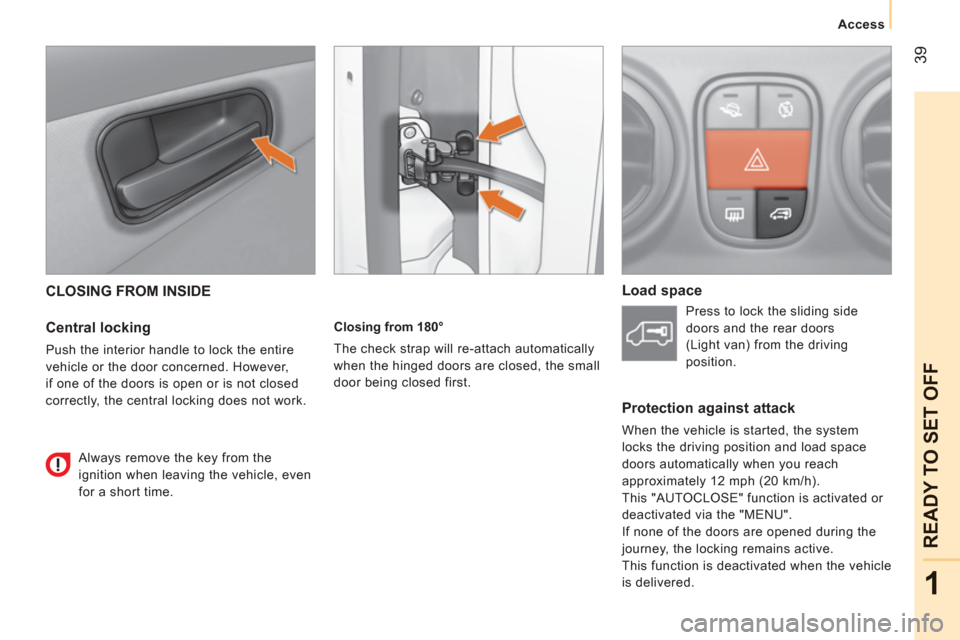
39
1
READY TO SET OFF
Access
CLOSING FROM INSIDE
Central locking
Push the interior handle to lock the entire
vehicle or the door concerned. However,
if one of the doors is open or is not closed
correctly, the central locking does not work.
Always remove the key from the
ignition when leaving the vehicle, even
for a short time.
Closing from 180°
The check strap will re-attach automatically
when the hinged doors are closed, the small
door being closed first.
Load space
Press to lock the sliding side
doors and the rear doors
(Light van) from the driving
position.
Protection against attack
When the vehicle is started, the system
locks the driving position and load space
doors automatically when you reach
approximately 12 mph (20 km/h).
This "AUTOCLOSE" function is activated or
deactivated via the "MENU".
If none of the doors are opened during the
journey, the locking remains active.
This function is deactivated when the vehicle
is delivered.
Page 45 of 180
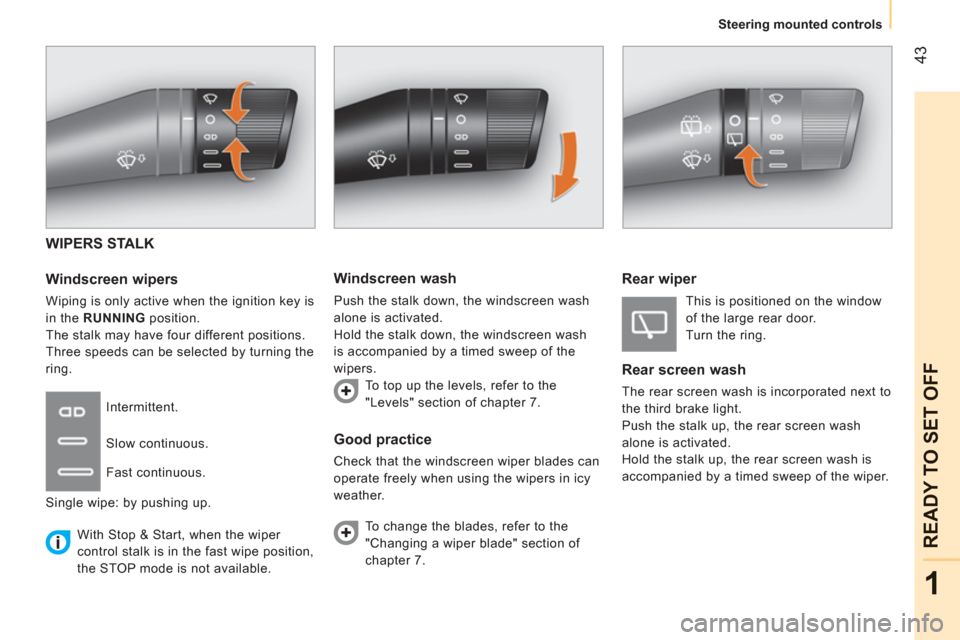
43
1
READY TO SET OFF
Steering mounted controls
WIPERS STALK
Windscreen wipers
Wiping is only active when the ignition key is
in the RUNNING position.
The stalk may have four different positions.
Three speeds can be selected by turning the
ring.
To change the blades, refer to the
"Changing a wiper blade" section of
chapter 7.
Good practice
Check that the windscreen wiper blades can
operate freely when using the wipers in icy
weather. Intermittent.
Slow continuous.
Fast continuous.
Single wipe: by pushing up.
Windscreen wash
Push the stalk down, the windscreen wash
alone is activated.
Hold the stalk down, the windscreen wash
is accompanied by a timed sweep of the
wipers.
To top up the levels, refer to the
"Levels" section of chapter 7.
Rear wiper
This is positioned on the window
of the large rear door.
Turn the ring.
Rear screen wash
The rear screen wash is incorporated next to
the third brake light.
Push the stalk up, the rear screen wash
alone is activated.
Hold the stalk up, the rear screen wash is
accompanied by a timed sweep of the wiper.
With Stop & Start, when the wiper
control stalk is in the fast wipe position,
the STOP mode is not available.
Page 55 of 180
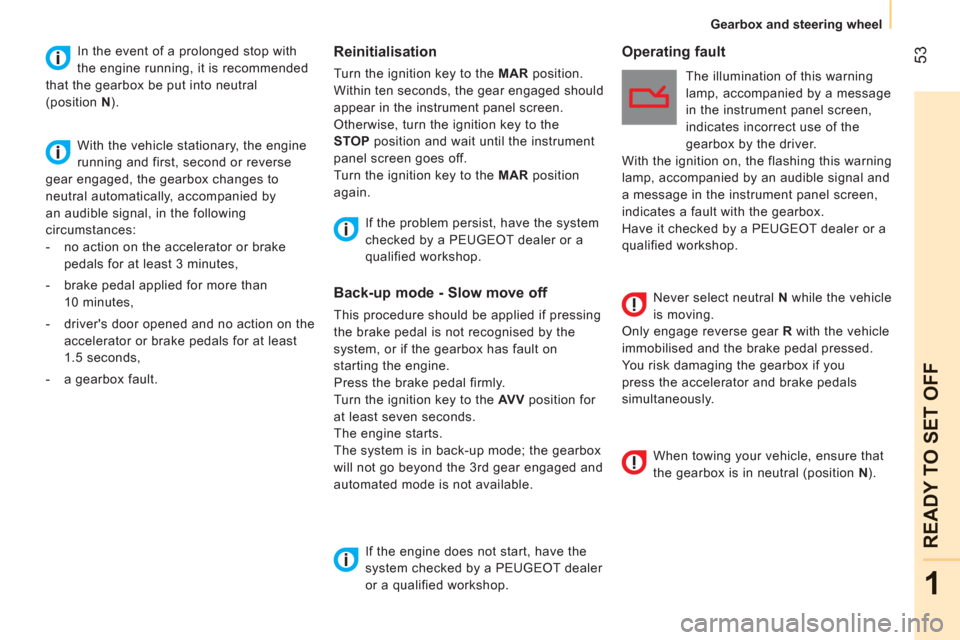
53
1
READY TO SET OFF
Gearbox and steering wheel
Reinitialisation
Turn the ignition key to the MAR
position.
Within ten seconds, the gear engaged should
appear in the instrument panel screen.
Otherwise, turn the ignition key to the
STOP
position and wait until the instrument
panel screen goes off.
Turn the ignition key to the MAR
position
again.
The illumination of this warning
lamp, accompanied by a message
in the instrument panel screen,
indicates incorrect use of the
gearbox by the driver.
With the ignition on, the flashing this warning
lamp, accompanied by an audible signal and
a message in the instrument panel screen,
indicates a fault with the gearbox.
Have it checked by a PEUGEOT dealer or a
qualified workshop.
If the problem persist, have the system
checked by a PEUGEOT dealer or a
qualified workshop.
Never select neutral N
while the vehicle
is moving.
Only engage reverse gear R
with the vehicle
immobilised and the brake pedal pressed.
You risk damaging the gearbox if you
press the accelerator and brake pedals
simultaneously.
Back-up mode - Slow move off
This procedure should be applied if pressing
the brake pedal is not recognised by the
system, or if the gearbox has fault on
starting the engine.
Press the brake pedal firmly.
Turn the ignition key to the AV V
position for
at least seven seconds.
The engine starts.
The system is in back-up mode; the gearbox
will not go beyond the 3 rd gear engaged and
automated mode is not available.
If the engine does not start, have the
system checked by a PEUGEOT dealer
or a qualified workshop.
Operating fault
In the event of a prolonged stop with
the engine running, it is recommended
that the gearbox be put into neutral
(position N
).
With the vehicle stationary, the engine
running and first, second or reverse
gear engaged, the gearbox changes to
neutral automatically, accompanied by
an audible signal, in the following
circumstances:
- no action on the accelerator or brake
pedals for at least 3 minutes,
- brake pedal applied for more than
10 minutes,
- driver's door opened and no action on the
accelerator or brake pedals for at least
1.5 seconds,
- a gearbox fault.
When towing your vehicle, ensure that
the gearbox is in neutral (position N
).
Page 56 of 180
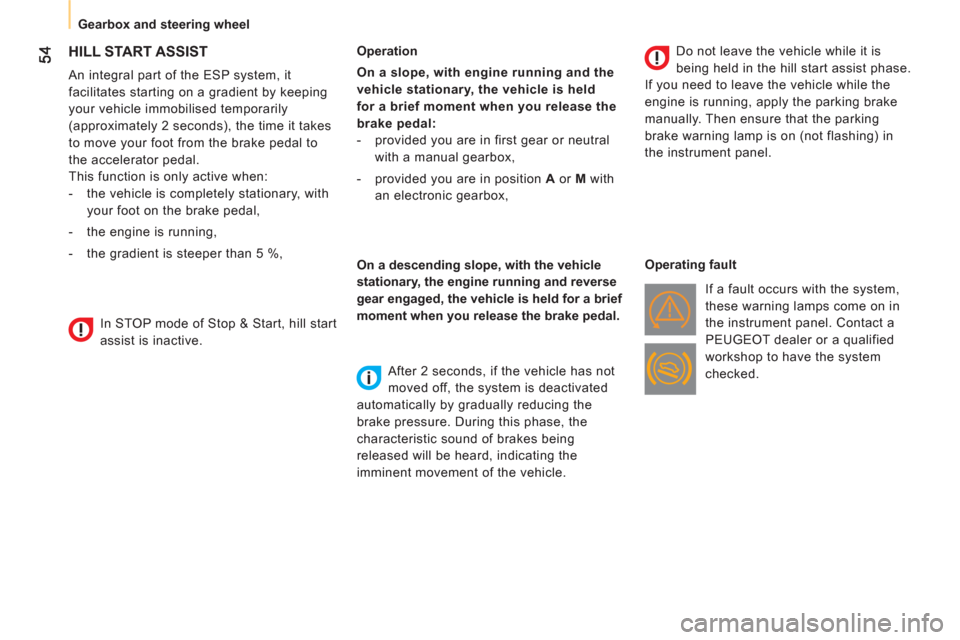
Gearbox and steering wheel
HILL START ASSIST
An integral part of the ESP system, it
facilitates starting on a gradient by keeping
your vehicle immobilised temporarily
(approximately 2 seconds), the time it takes
to move your foot from the brake pedal to
the accelerator pedal.
This function is only active when:
- the vehicle is completely stationary, with
your foot on the brake pedal,
- the engine is running,
- the gradient is steeper than 5 %,
Operation
On a slope, with engine running and the
vehicle stationary, the vehicle is held
for a brief moment when you release the
brake pedal:
- provided you are in first gear or neutral
with a manual gearbox,
- provided you are in position A
or M
with
an electronic gearbox,
On a descending slope, with the vehicle
stationary, the engine running and reverse
gear engaged, the vehicle is held for a brief
moment when you release the brake pedal.
After 2 seconds, if the vehicle has not
moved off, the system is deactivated
automatically by gradually reducing the
brake pressure. During this phase, the
characteristic sound of brakes being
released will be heard, indicating the
imminent movement of the vehicle.
Do not leave the vehicle while it is
being held in the hill start assist phase.
If you need to leave the vehicle while the
engine is running, apply the parking brake
manually. Then ensure that the parking
brake warning lamp is on (not flashing) in
the instrument panel.
Operating fault
If a fault occurs with the system,
these warning lamps come on in
the instrument panel. Contact a
PEUGEOT dealer or a qualified
workshop to have the system
checked.
In STOP mode of Stop & Start, hill start
assist is inactive.
Page 59 of 180
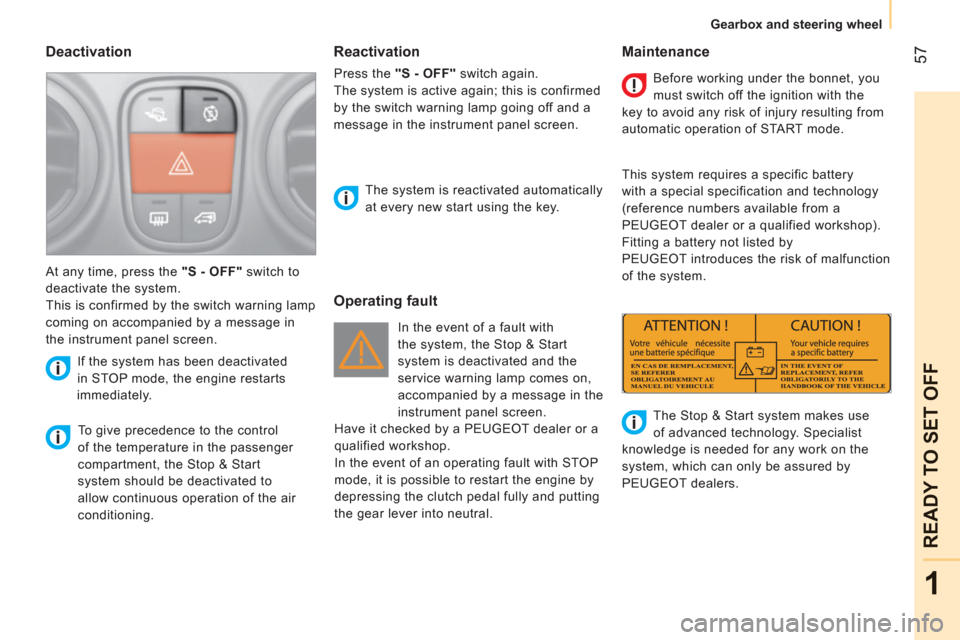
57
1
READY TO SET OFF
Gearbox and steering wheel
Deactivation
To give precedence to the control
of the temperature in the passenger
compartment, the Stop & Start
system should be deactivated to
allow continuous operation of the air
conditioning.
The system is reactivated automatically
at every new start using the key.
At any time, press the "S - OFF"
switch to
deactivate the system.
This is confirmed by the switch warning lamp
coming on accompanied by a message in
the instrument panel screen.
If the system has been deactivated
in STOP mode, the engine restarts
immediately.
Operating fault
Maintenance
In the event of a fault with
the system, the Stop & Start
system is deactivated and the
service warning lamp comes on,
accompanied by a message in the
instrument panel screen.
Have it checked by a PEUGEOT dealer or a
qualified workshop.
In the event of an operating fault with STOP
mode, it is possible to restart the engine by
depressing the clutch pedal fully and putting
the gear lever into neutral. Before working under the bonnet, you
must switch off the ignition with the
key to avoid any risk of injury resulting from
automatic operation of START mode.
This system requires a specific battery
with a special specification and technology
(reference numbers available from a
PEUGEOT dealer or a qualified workshop).
Fitting a battery not listed by
PEUGEOT introduces the risk of malfunction
of the system.
The Stop & Start system makes use
of advanced technology. Specialist
knowledge is needed for any work on the
system, which can only be assured by
PEUGEOT dealers.
Reactivation
Press the "S - OFF"
switch again.
The system is active again; this is confirmed
by the switch warning lamp going off and a
message in the instrument panel screen.
Page 115 of 180
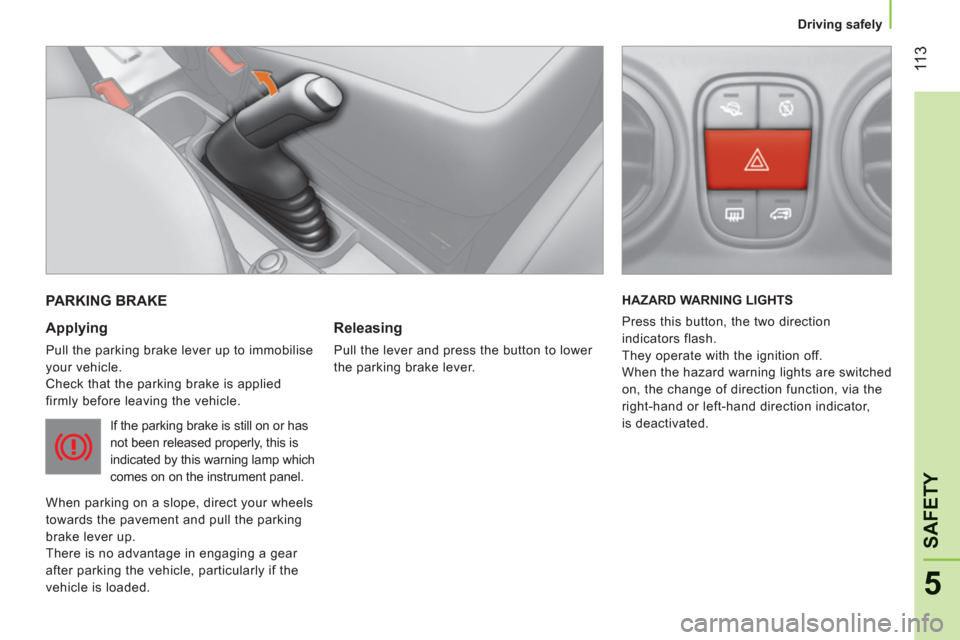
11
3
5
SAFETY
Driving safely
PARKING BRAKE
Applying
Pull the parking brake lever up to immobilise
your vehicle.
Check that the parking brake is applied
firmly before leaving the vehicle.
If the parking brake is still on or has
not been released properly, this is
indicated by this warning lamp which
comes on on the instrument panel.
When parking on a slope, direct your wheels
towards the pavement and pull the parking
brake lever up.
There is no advantage in engaging a gear
after parking the vehicle, particularly if the
vehicle is loaded.
Releasing
Pull the lever and press the button to lower
the parking brake lever. HAZARD WARNING LIGHTS
Press this button, the two direction
indicators flash.
They operate with the ignition off.
When the hazard warning lights are switched
on, the change of direction function, via the
right-hand or left-hand direction indicator,
is deactivated.
Page 117 of 180
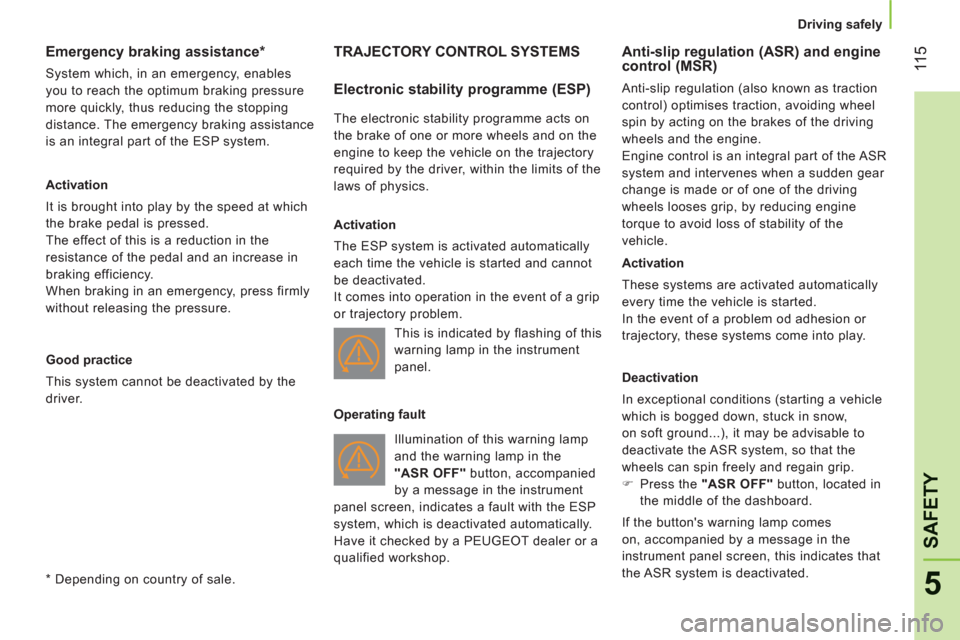
11
5
5
SAFETY
Driving safely
Emergency braking assistance *
System which, in an emergency, enables
you to reach the optimum braking pressure
more quickly, thus reducing the stopping
distance. The emergency braking assistance
is an integral part of the ESP system.
Activation
It is brought into play by the speed at which
the brake pedal is pressed.
The effect of this is a reduction in the
resistance of the pedal and an increase in
braking efficiency.
When braking in an emergency, press firmly
without releasing the pressure.
Good practice
This system cannot be deactivated by the
driver.
*
Depending on country of sale.
TRAJECTORY CONTROL SYSTEMS
Electronic stability programme (ESP)
The electronic stability programme acts on
the brake of one or more wheels and on the
engine to keep the vehicle on the trajectory
required by the driver, within the limits of the
laws of physics.
Activation
The ESP system is activated automatically
each time the vehicle is started and cannot
be deactivated.
It comes into operation in the event of a grip
or trajectory problem.
Illumination of this warning lamp
and the warning lamp in the
"ASR OFF"
button, accompanied
by a message in the instrument
panel screen, indicates a fault with the ESP
system, which is deactivated automatically.
Have it checked by a PEUGEOT dealer or a
qualified workshop.
Anti-slip regulation (ASR) and engine
control (MSR)
Anti-slip regulation (also known as traction
control) optimises traction, avoiding wheel
spin by acting on the brakes of the driving
wheels and the engine.
Engine control is an integral part of the ASR
system and intervenes when a sudden gear
change is made or of one of the driving
wheels looses grip, by reducing engine
torque to avoid loss of stability of the
vehicle.
Activation
These systems are activated automatically
every time the vehicle is started.
In the event of a problem od adhesion or
trajectory, these systems come into play.
Deactivation
In exceptional conditions (starting a vehicle
which is bogged down, stuck in snow,
on soft ground...), it may be advisable to
deactivate the ASR system, so that the
wheels can spin freely and regain grip.
�)
Press the "ASR OFF"
button, located in
the middle of the dashboard.
If the button's warning lamp comes
on, accompanied by a message in the
instrument panel screen, this indicates that
the ASR system is deactivated. This is indicated by flashing of this
warning lamp in the instrument
panel.
Operating fault
Page 118 of 180
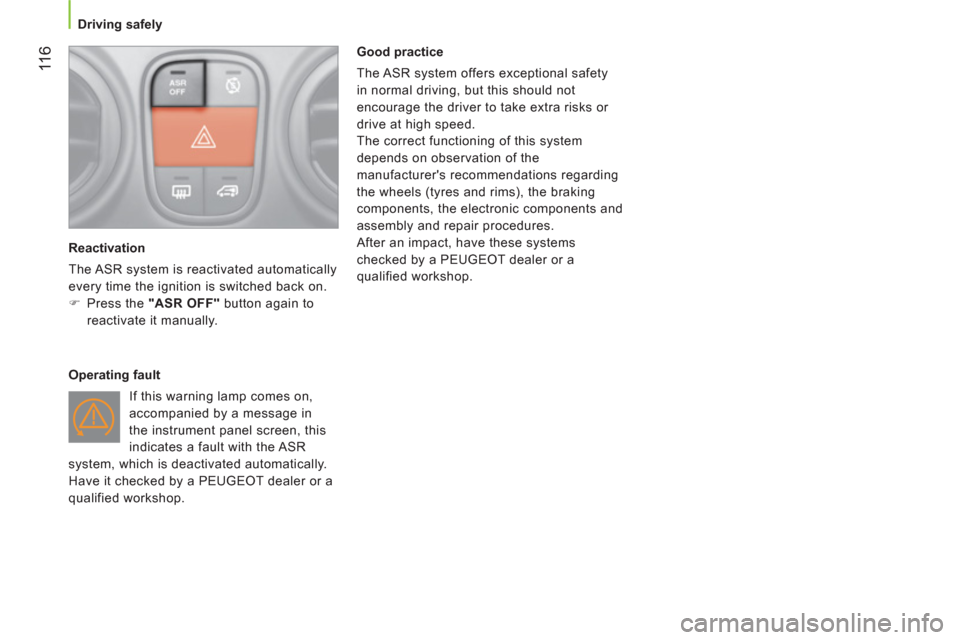
11
6
Driving safely
Reactivation
The ASR system is reactivated automatically
every time the ignition is switched back on.
�)
Press the "ASR OFF"
button again to
reactivate it manually.
Operating fault
If this warning lamp comes on,
accompanied by a message in
the instrument panel screen, this
indicates a fault with the ASR
system, which is deactivated automatically.
Have it checked by a PEUGEOT dealer or a
qualified workshop.
Good practice
The ASR system offers exceptional safety
in normal driving, but this should not
encourage the driver to take extra risks or
drive at high speed.
The correct functioning of this system
depends on observation of the
manufacturer's recommendations regarding
the wheels (tyres and rims), the braking
components, the electronic components and
assembly and repair procedures.
After an impact, have these systems
checked by a PEUGEOT dealer or a
qualified workshop.
Page 119 of 180
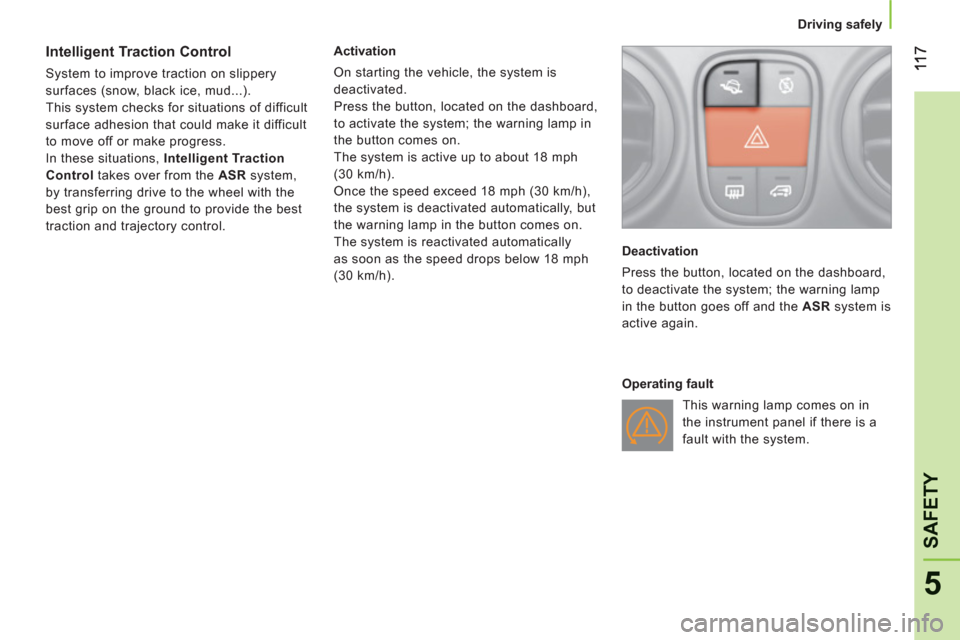
5
SAFETY
Driving safely
Intelligent Traction Control
System to improve traction on slippery
surfaces (snow, black ice, mud...).
This system checks for situations of difficult
surface adhesion that could make it difficult
to move off or make progress.
In these situations, Intelligent Traction
Control
takes over from the ASR
system,
by transferring drive to the wheel with the
best grip on the ground to provide the best
traction and trajectory control.
Activation
On starting the vehicle, the system is
deactivated.
Press the button, located on the dashboard,
to activate the system; the warning lamp in
the button comes on.
The system is active up to about 18 mph
(30 km/h).
Once the speed exceed 18 mph (30 km/h),
the system is deactivated automatically, but
the warning lamp in the button comes on.
The system is reactivated automatically
as soon as the speed drops below 18 mph
(30 km/h).
Deactivation
Press the button, located on the dashboard,
to deactivate the system; the warning lamp
in the button goes off and the ASR
system is
active again.
Operating fault
This warning lamp comes on in
the instrument panel if there is a
fault with the system.